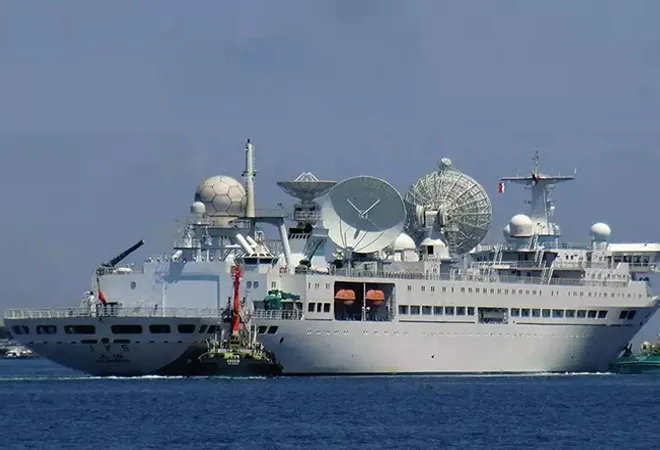
The presence of a Chinese research vessel in Sri Lanka has
caused some disquiet in New Delhi. Last week, when an Indian foreign ministry spokesperson
observed that the visit of the
Yuan Wang-5, a Chinese space and satellite tracking ship, was being “carefully monitored”, there was a general air of assuredness in New Delhi that Sri Lanka would not allow for any developments that are damaging to Indian security interests. Indian officials had raised apprehensions over the YW-5’s presumed intelligence-gathering capabilities.
The confidence in New Delhi has now dissipated. Days after it asked Beijing to defer the visit of its research ship to Hambantota port citing security considerations, Colombo reversed its decision. The underlying reasons are still unclear, but it seems Sri Lankan officials were persuaded by the argument that the visiting Chinese ship is
not classified as a warship, and therefore not liable to being barred from entering a Sri Lankan port. As a space and satellite tracking ship, the YW-5 poses no direct threat to India’s “unity, integrity, and security”—at least not in a way that violates the 1987 Indo-Sri Lankan Accord, which calls upon the two countries to prevent foreign activity in their respective territories that could pose a threat to the other.
Sri Lanka’s initial refusal to allow the docking of the Chinese ship had upset Beijing, with Chinese officials criticising Colombo for its “senseless attempts” to prevent what they saw as mere “replenishment” of a research ship.
It is likely that Sri Lanka authorities succumbed to pressure from China, a key developmental partner for Colombo. Sri Lanka’s initial refusal to allow the docking of the Chinese ship had upset Beijing, with Chinese officials
criticising Colombo for its “senseless attempts” to prevent what they saw as mere “replenishment” of a research ship. Beijing had urged “relevant parties” (a barely veiled reference to India) to view China’s marine scientific research missions in context and “refrain from interfering with normal and legitimate maritime activities”.
There are, it seems, two ways of construing the visit of the YW-5. One is to acknowledge that in an age of openness and transparency, surveillance at sea is a legitimate activity. As some Indian observers have
noted, friendly and hostile forces carry out snooping in the Asian littorals regularly, with regional states keeping track of foreign surveillance in their waters. The reality for New Delhi is that China has had Hambantota port for 99 years, and is entitled to use it for non-military activity in a manner it deems fit.
China’s Indian Ocean strategy
But one can view Yung Wang 5’s deployment in the context of China’s evolving
Indian Ocean strategy: not to physically dominate the region, but to create an enabling environment for its strategic missions. China rarely demonstrates naval power in the Indian Ocean; its approach is aimed essentially at expanding stakeholdership in the littorals through a gradual expansion of quasi-military presence. In the Bay of Bengal and the Andaman Sea, China has been sending not warships, but survey and research vessels, as a way of marking its presence in the region. Beijing’s game plan is to demonstrate to India and the other Bay of Bengal states that Chinese activities are in line with China’s rising global heft. It has sought to reassure regional states that unless necessitated by operational reasons, it would desist from deploying warships in foreign ports.
Beijing’s game plan is to demonstrate to India and the other Bay of Bengal states that Chinese activities are in line with China’s rising global heft.
Yet China is always pushing the envelope—both in the Western Pacific and in the Indian Ocean. In the South China Sea, China uses
maritime militias to threaten any activity deemed inimical to Chinese sovereign interests. The Chinese policy in the Indian Ocean is gradual and relentless encroachment that expands China’s tactical space and asserts Beijing’s rights and interests in spaces outside its sphere of natural influence. The approach isn’t necessarily a threat to regional powers, but it willy-nilly undermines the latter’s capacity to compete with China. Even if not inherently malevolent, China’s strategy manifests in ways damaging to the interests of other countries.
The yardstick for whether China’s activities in Sri Lanka are legitimate or not would be whether Chinese actions are acceptable to Sri Lankan strategic experts. Here, the
majority view appears to suggest that China’s deployments are controversial. Beijing’s goal, Sri Lankan experts say is to leverage Lanka’s indebtedness to display Chinese strategic heft. China, they contend, is “putting Hambantota port to dual use, commercial and military,” all in a bid to generate an enabling environment for Chinese strategic activity in the island country.
India’s security concerns
New Delhi’s concern, then, isn’t only that the YW-5 could be a spy ship. India’s security officials worry that China would use the ship’s visit as a precedent of sorts for future deployments by Chinese warships to Sri Lanka citing reasons for the operational turnaround. Already, the People’s Liberation Army Navy (PLAN) has been actively seeking logistical bases in the Indian Ocean Region (IOR). Having built a ‘dual-use’ facility at Gwadar in Pakistan, Beijing reportedly has plans to construct similar facilities in Kenya, Cambodia, Seychelles, and Mauritius. This deployment, Indian observers suspect, is part of a larger plan to establish China’s credentials as a security and economic provider in the Indian Ocean.
The Chinese policy in the Indian Ocean is gradual and relentless encroachment that expands China’s tactical space and asserts Beijing’s rights and interests in spaces outside its sphere of natural influence.
The visit of the YW-5 poses a larger ethical dilemma for New Delhi: Should it allow seemingly suspicious foreign activity in the littorals, simply because the subject professes to advance a principled cause (scientific research)? Can China be allowed to ride unchecked on the back of a body of international rules that privileges user-state rights, over the security concerns of littoral nations? In essence, India must choose between doing what’s required by law (and propriety), and demanding special rights in its near-seas—especially in circumstances when international law does not fully account for the foreign activity that could imperil India’s national security. It’s a wicked problem with no easy answers, but India must act. Time is of the essence.
The views expressed above belong to the author(s). ORF research and analyses now available on Telegram! Click here to access our curated content — blogs, longforms and interviews.



 The presence of a Chinese research vessel in Sri Lanka has
The presence of a Chinese research vessel in Sri Lanka has  PREV
PREV


